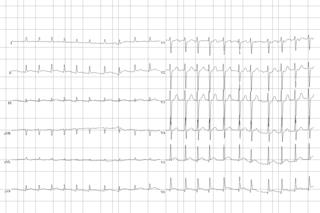How interesting to see a paper which suggests that thyroid hormone might have a very positive role in:
A situation other than an obvious thyroid disorder.
A heart issue where many doctors would run away from prescribing any thyroid hormone even if hypothyroidism were proved.
With a result which depends on fundamental structural changes.
Of course, this paper looks at rats - and there are many reasons to be careful about transferring ideas from rats to humans.
J Card Fail. 2014 Oct 8. pii: S1071-9164(14)01226-3. doi: 10.1016/j.cardfail.2014.10.003. [Epub ahead of print]
Thyroid Hormone Replacement Therapy Attenuates Atrial Remodeling and Reduces Atrial Fibrillation Inducibility in a Rat Myocardial Infarction-Heart Failure Model.
Zhang Y1, Dedkov EI2, Lee B 3rd2, Li Y2, Pun K2, Gerdes AM2.
Author information
Abstract
INTRODUCTION:
Heart failure (HF) is associated with increased atrial fibrillation (AF) risk. Accumulating evidence suggests the presence of myocardial tissue hypothyroidism in HF, which may contribute to HF development. Our recent report demonstrated that hypothyroidism, like hyperthyroidism, leads to increased AF inducibility. This study was designed to investigate the effect of thyroid hormone (TH) replacement therapy on AF arrhythmogenesis in HF.
METHODS AND RESULTS:
Myocardial infarction (MI) was produced in rats by coronary artery ligation. Rats with large MIs (>40%) were randomized into L-thyroxine (T4, n=14) and placebo (n=15) groups 2 weeks after MI. Rats received 3.3 mg T4 (in 60-day release form) or placebo pellets in respective groups for 2 months. Compared with the placebo, T4 treatment improved cardiac function and decreased left ventricular internal diameters as well as left atrial diameter. T4 treatment attenuated atrial effective refractory period prolongation (45±1.5 ms in placebo group vs 37±1.6 ms in T4 group, P<0.01) and reduced AF inducibility (AF/atrial flutter /tachycardia were inducible in 11/15 rats, or 73% in placebo vs 4/14 rats, or 29% in the T4 treated group, P<0.05). Arrhythmia reduction was associated with decreased atrial fibrosis but was not associated with connexin 43 changes.
CONCLUSION:
To our knowledge this is the first study demonstrating that TH replacement therapy in HF attenuates atrial remodeling and reduces AF inducibility post MI-HF. Clinical studies are needed to confirm such benefits in patients.
Copyright © 2014 Elsevier Inc. All rights reserved.
KEYWORDS:
Arrhythmogenesis; Atrial fibrillation; Heart failure; Thyroid hormone
PMID: 25305503
ncbi.nlm.nih.gov/pubmed/253...
Rod


